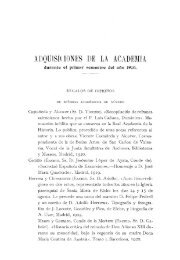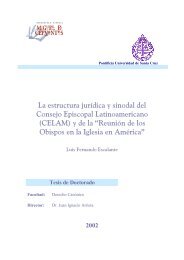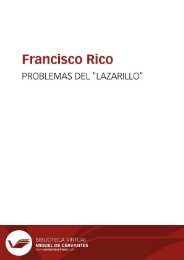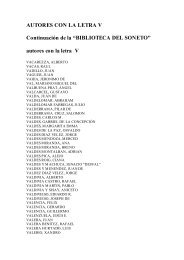Create successful ePaper yourself
Turn your PDF publications into a flip-book with our unique Google optimized e-Paper software.
Anales galdosianos [Publicaciones periódicas]. Año XII, 1977<br />
itself as a fiction about fiction, and the text assumes the power to create and to destroy through the<br />
word, one in the process of the other.<br />
Manso, for that matter, is a word, a sign. He/It signals an apparent deficiency. In terms of the<br />
characterization in the inner novel, Manso is no man of action because he is a philosopher, a cerebral<br />
person. At that level, one can read his declaration of non-existence as the accurate self-assessment<br />
of an individual so meek that his existence has no significance. From the other perspective, that of<br />
fictionality, Manso's distance from vital existence is consistent with his proclaimed non-existence<br />
because he is a creature born of thought who, by the standards of tangibility, remains a thought.<br />
Part of <strong>Galdós</strong>' game is to imbue the imagined flesh-and-blood figure he has penned with the very<br />
nature of fictionality. As a result, Manso is a rare character in that his personality as a man does not<br />
transcend his fictionality but rather is determined by it. Clearly, the individual living out the patterns<br />
of a predetermined existence (his autonomy is predetermined) and who harmonizes, as Manso does<br />
and as Manuel does not, with the particular cosmic scheme responsible for his nature is by definition<br />
meek. Accordingly, if we sit in condemnation of the abulic philosopher who lionizes the symbols of<br />
bourgeois values, as Nimetz suggests that <strong>Galdós</strong> does (pp. 60-61), we miss the mark. <strong>Galdós</strong> knew<br />
full well that when the Book of Psalms proclaims that «the meek shall inherit the earth; and shall<br />
delight themselves in the abundance of peace» (37: 11), it establishes an equivalency between the<br />
meek and the righteous in opposition to the wicked. The biblical promise, furthermore, is that the Lord<br />
will beautify the meek with salvation (Psalms 149: 4). On both the interior and the framing level of the<br />
novel, Manso has been so beautified. In the novel-within-the-novel, Manso's retreat is the deliverance<br />
of the righteous from the wicked. After having been sucked for a period into the sullied terrain of<br />
the petty bourgeoisie, he meets a fate that corresponds to the moral and intellectual distinction of his<br />
character and is permanently distanced from that besmirched world. Through the framing structure,<br />
Manso's lord and master has accorded his meek-willed invention the beauty and salvation inherent<br />
in the artistic creation.<br />
Gerald Gillespie has defined Manso as a disabused intellectual who in his «real» existence lives in<br />
anguished alienation 152 . «To be sure». But the spatial parameters of this alienation encompass two<br />
directions: not only the usual conception of existing «outside» but also the idea of «above». Modern<br />
literature's alienated characters exist in an ironic zone where their apartness tends to demean their<br />
worth in the eyes of those who share their fictional world but causes in the reader a recognition of their<br />
152 «Reality and Fiction in the Novels of <strong>Galdós</strong>», Anales Galdosianos , 1 (1966), 19.<br />
110

















